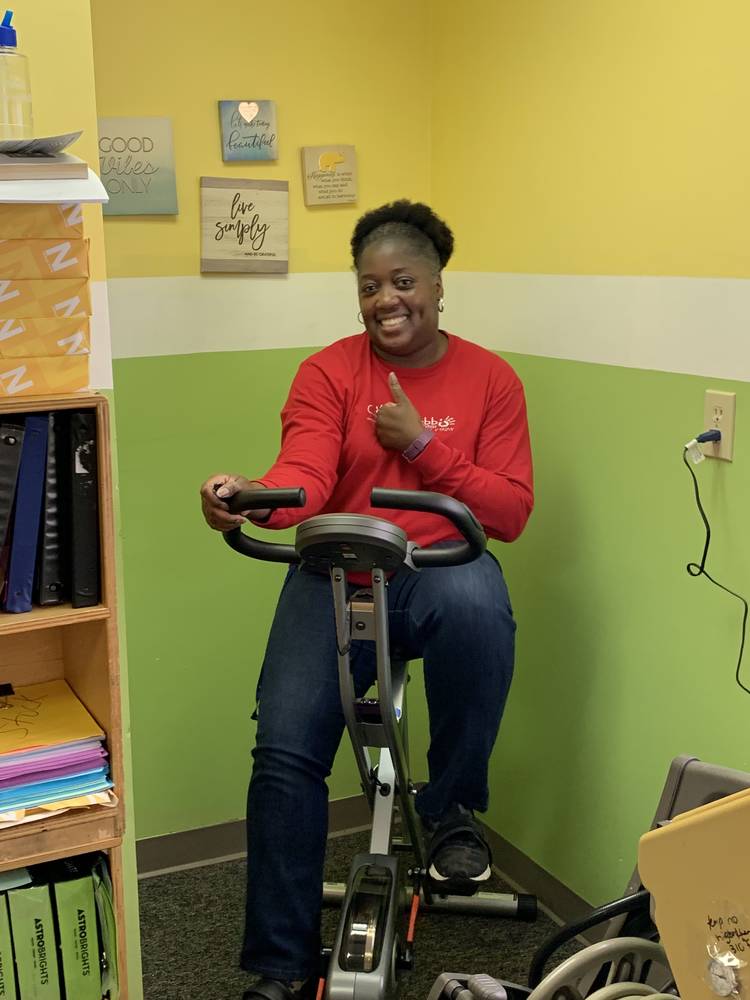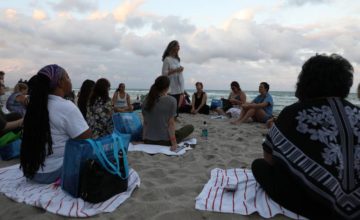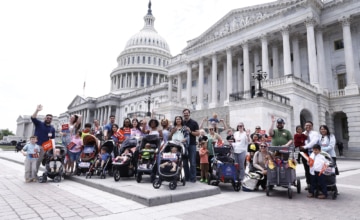Abstract
Early childhood educators, a critical workforce sector that is responsible for the well-being of children during the most influential period of development, earn unlivable wages, experience low social status, and work in unsupportive and demanding environments. Children’s resiliency is heavily influenced by the capacity of the adults in their lives to buffer exposure to stress by providing responsive, sensitive care, especially in the early years of life. The well-being of early childhood educators and the social–emotional health of the children in their care is interconnected. Taking care of children includes taking care of their caregivers. Be Well Care Well, an evidence-based program developed and piloted in South Carolina, was designed to do just that and demonstrates that attending to the well-being of early childhood educators improves the quality of interactions they have with the children in their care.
If you’ve ever been responsible for children while nursing a cold or even a headache, you know that your well-being influences your ability to be responsive and engaged with the children. To anyone who has cared for young children, it is no surprise to learn that a caregiver’s health and wellness impact the quality of his or her interactions with their children. Unfortunately, a great number of early childhood education providers are faced with far greater impediments to their well-being than the common cold. Well-being has been defined as an individual’s “personal professional fulfillment, satisfaction, purposefulness, and happiness” (Acton & Glasgow, 2015, p. 102).
A teacher’s well-being can be influenced by factors including emotional and physical health, job satisfaction, financial stability, workplace climate, and a sense of self-efficacy and empowerment (Hall-Kenyon et al., 2014).
Ask any early childhood professional, whether teacher, director, trainer, coach, or policy leader, about the well-being of early childhood education providers and you will likely hear stories and concerns about the enormous stress many early childhood education providers carry from their home lives into their workplaces, leaving them feeling overwhelmed and challenged by the behaviors in their classrooms and distracted by their own stressors.
Anecdotal evidence from infant/toddler specialists in South Carolina indicated that the degree of early childhood education teachers’ stress is frequently highlighted during their team teacher reflection meetings, a time set aside for the infant/toddler specialist and teachers from a particular classroom to meet, reflect on their interactions with the children in their care, and discuss any recent challenges encountered in attempting to implement relationship-based caregiving strategies. The infant/toddler specialists frequently report having to abandon their planned content for these meetings to respond instead to a teacher’s tearful description of personal hardships that consume her thoughts and energy, leaving little room for reflections about the care they provide to children (unpublished South Carolina Program for Infant/Toddler Care staff meeting notes, June 2017). The need to adjust the planned content to respond to early childhood education providers’ personal concerns and worries has been even more pronounced since the beginning of the COVID-19 pandemic (unpublished South Carolina Program for Infant/Toddler Care staff meeting notes, August 2020).
Research about the early childhood education workforce aligns with these anecdotal reports. A large number of women employed in early childhood education settings report symptoms qualifying them for a diagnosis of clinical depression (Linnan et al., 2017). This fact is troubling for both the teacher and the children in her care. Young children whose caregivers are experiencing stress and mental health difficulties are more likely to exhibit concerns such as aggression and anger, as well as internalized problems including anxiety, sadness, and withdrawal (Hamre & Pianta, 2004; Jeon et al., 2014). Not only do children with more stressed and depressed caregivers exhibit challenging behaviors, depressed teachers are also more likely to perceive children’s typical behaviors as problematic (Jeon et al., 2014). Early childhood education teachers who experience high levels of stress, depression, and anxiety are less likely to have positive, supportive interactions with children and are more likely to contribute to the disturbing practice of preschool expulsion (Gilliam, 2005; Gilliam & Shahan 2006). These teachers also demonstrate high rates of obesity and high blood pressure, low levels of activity, and do not get enough sleep (Linnan et al., 2017).
Early childhood education providers, a critical workforce sector that is responsible for the well-being of children during the most influential period of development, earn unlivable wages, experience low social status, and work in unsupportive and demanding environments (Whitebook et al., 2014). Addressing these systemic challenges that are driven by social values will take time. But children can’t wait. Children’s resiliency is heavily influenced by the capacity of the adults in their lives to buffer exposure to stress by providing responsive, sensitive care, especially in the early years of life (Hostinar et al., 2014, Thompson, 2014). Early childhood education providers, who often spend more waking hours with a child during the week than parents, have a tremendous impact on a child’s social–emotional health and development. The well-being of early childhood education teachers and the social–emotional health of the children in their care is interconnected. Taking care of children includes taking care of their caregivers, and Be Well Care Well (BWCW) does just that.
The BWCW Program
The objective of BWCW is to build resiliency in early childhood education providers to reduce and buffer the effects of stress and hardship and, in so doing, bolster their ability to sensitively meet the developing social–emotional needs of the young children in their care. BWCW aims to support the well-being of early childhood education providers across eight dimensions of wellness commonly recognized in the public health field: Emotional, Environmental, Financial, Intellectual, Occupational, Physical, Social, and Spiritual. The 12-month program encourages the development of social support networks, improvement of physical and emotional health, development of stress management and reduction techniques, improvement in caregivers’ sense of self-efficacy and executive function, and access to financial resources and services.

The well-being of early childhood education teachers and the social–emotional health of the children in their care is interconnected.
There are four primary components of the BWCW model: well-being coaches, well-being committees, the BWCW Well-Being Activities Guide (Schnake & Maguire, 2017), and community partnerships.
Well-Being Coach
Each participating early childhood education program is assigned a well-being coach who is a helper for the journey, connecting programs with state and local resources to support achievement of well-being goals. The well-being coaches kick off a program’s participation with an orientation during which foundational wellness concepts are shared, well-being committees are identified, and participants complete an interest survey to guide the program’s selection of well-being goals. To sustain well-being improvements gained during participation, efforts are made to create a culture of well-being in the program rather than focusing exclusively on individual goals. This process starts by requesting that the orientation is attended by all staff at the early childhood education program including administrators, teachers, and any auxiliary staff the program may employ such as cooks, janitorial staff, and bus drivers. With this level of participation, all staff members can influence and participate in the well-being of their early childhood education community.

A caregiver’s health and wellness impact the quality of his or her interactions with their children.
Well-Being Committee
The well-being committee is made up of at least two early childhood education teachers and one program administrator. They are responsible for working with their peers and the well-being coach to develop strategies that motivate and guide the group to accomplish well-being goals. Often the early childhood education staff members who choose to serve on well-being committees are individuals who are already engaged in activities that support their own health and wellness and are eager to encourage their peers to do the same. Their enthusiasm for matters related to health tends to be contagious and these “cheerleaders” can have a tremendous influence on their peers’ motivation to make healthy changes that promote overall well-being.
Well-Being Activities Guide
The Well-Being Activities Guide (Schnake & Maguire, 2017) was designed to help providers identify activities that will support their well-being in one or more of the 8 Dimensions of Wellness previously noted. While the program developers had little success in identifying existing well-being initiatives for early childhood education providers that could be replicated or adapted, they were able to build on the work of colleagues at the Medical University of South Carolina’s Boeing Center for Children’s Wellness (n.d.) for the development of the Well-Being Activities Guide. Their school-based wellness program uses an evidence-based School Wellness Checklist that helped inform the creation of the Well-Being Activities Guide which was refined with input from focus groups comprised of early childhood education program directors and teachers.
Focus group participants were engaged in two ways. First, the facilitators asked participants if they would be interested in participating in a wellness initiative and what, if any, barriers they could foresee to participating. Respondents agreed that a wellness program was of interest. Concerns about participation focused primarily on time constraints. Directors and teachers reported that spending additional time at work, after hours, was unappealing but offered suggestions for ways to entice participation. These included providing plenty of advanced notice of trainings or events and planning shorter meetings that could take place during staff breaks. Focus group participants also recommended offering incentives such as food, money, and prizes to encourage participation, particularly for events or meetings held after typical work hours. Next, the facilitators presented the proposed well-being activities and asked the focus group to describe their interest in participating in each activity. Many of the activity ideas were viewed as interesting and garnered excitement from the group. Early childhood education program directors in one of the focus groups speculated that participating in a well-being program might improve staff morale and lead to better staff retention.
Informed by the focus group responses, the final well-being activities selection was chosen with input from an expert review committee that included a pediatrician, a professor of psychiatry and behavioral science, an early childhood education specialist, a professor of early childhood education, and two public health officials.
The well-being committee, informed by the interest surveys completed by participants during orientation, uses the Well-Being Activity Guide to identify the wellness priorities for their program. The Well-Being Activity Guide is organized into seven categories:
- Getting Started,
- Team Building Activities,
- Physical Activity and Nutrition,
- Culture of Well-Being,
- Administrative Goals,
- Relaxation and Reflection, and
- Sustainability.
All programs are required to complete the activities in the Getting Started category which include: establishment of a well-being committee, express commitment to prioritizing staff well-being written in program materials (e.g., staff handbook), and identification of specific well-being goals using the Well-Being Activities Guide. Outside of the Getting Started category, well-being committees may select as many or as few well-being activities across categories as they would like. Well-being activity examples include on-site exercise and nutrition classes, health screening opportunities, stress management and self-care workshops, access to employee assistance programs, and relaxation space for staff. The well-being coaches facilitate goal achievement by planning activities, identifying and customizing resources, and coordinating services with local and state partners.
Well-Being Packages
Participating programs can also select from four well-being packages that include supplies and equipment to support well-being. The physical activity package, for example, includes a compact exercise bike for staff to use at work. The nutrition package includes a blender and other meal preparation supplies to make it easier to prepare healthy meals and snacks at work. The relaxation package includes a chair massage insert that can transform an office chair into a massage chair. The service package offers a $250 gift card that can be used for any wellness activity such as registration fees for staff to participate in a community run/walk or a healthy cooking class. The well-being packages provide practical, on-site resources that generate excitement and encourage early childhood education providers to attend to multiple aspects of well-being.

Participating programs can also select from four well-being packages that include supplies and equipment to support well-being. The physical activity package, for example, includes a compact exercise bike for staff to use. Darneyelle Washington, director of Charles Webb Children’s Center, exercises during her break on a stationary bike provided as part of the center’s participation in Be Well Care Well.
Community Partners
To further enhance the well-being toolkit available to participating early childhood education providers, the BWCW team works together to identify community partners that offer health and wellness resources. In some instances, partners provide statewide services, and a relationship with the organization’s central office can garner services for all BWCW participating programs across the state. One such partner is a state nonprofit offering streamlined access to federal, state, and local benefits and assistance programs; free tax assistance; and community trainings. Building on their existing resources and professional offerings, the nonprofit created and delivers trainings to participating BWCW sites on the following topics: mental health awareness, financial health, understanding communication styles, and self-care. At the local level, well-being coaches establish relationships with community businesses to negotiate free or discounted wellness services such as discounted massages at a local spa, low-cost grocery shopping tours and cooking classes, dental clinics, and exercise classes.
The multiple features of BWCW program—well-being coaches, well-being committees, the Well-Being Activities Guide, and community partnerships—are in place to support the early childhood education teachers’ well-being so they can engage in sensitive and responsive interactions that promote children’s social–emotional health and development.
Impact
Results from a 2-year comprehensive evaluation show BWCW to have a meaningful impact on the well-being of early childhood education providers across multiple indicators including: personal strength and resilience, worker stress, job satisfaction, motivation toward health, and engagement in physical activity. Specifically, the more hours that early childhood education providers engaged in BWCW, the greater their improvement of scores across all of these domains. In addition, the quality of teacher–child interactions improved in a dose-response fashion measured by the CHILD (Climate of Healthy Interactions for Learning and Development; Gilliam & Reyes, 2017), an observational tool that measures the social–emotional climate in early childhood education classrooms. The more well-being activities early childhood education providers participated in, the higher their scores on the CHILD across all domains. Impact during the COVID-19 pandemic showed similar positive changes in teachers, although early childhood education providers reported much higher levels of stress overall during the pandemic. This result shows that BWCW can be impactful, even during the most stressful of times.
Anecdotal feedback from participants indicates early childhood education providers have enjoyed participating in BWCW and have made meaningful lifestyle changes to improve their health. One participating family early childhood education provider proudly explained to her well-being coach that, as a result of participating in the program, she decided to get a mammogram and selected a primary care doctor—things she hadn’t done in more than 10 years. The director of a participating early childhood education center reported,
Be Well Care Well has helped my staff and center in so many ways. I must start off by saying we are happy and healthy now! We now take time to meditate and make sure we, ourselves, are healthy mentally, social, and emotionally.
As part of their well-being activities, this center director and her staff participated together in a walking challenge, group swim lessons, and dedicated time during the work day for meditating.
Participants from another early childhood education center posted a white board in their staff room and each day listed headings such as “Motivational Monday” followed by instructions to “write a statement or quote to motivate and help your coworkers have a great day.” This type of response and action has played out similarly with all participating programs, validating the importance of connecting this population with resources and emphasizing the importance of their own self-care.
Qualitative interviews of participating early care education providers demonstrated that all participants reported positive changes related to participation in the program, with the largest reported improvements including increased physical activity, social networks and relationships, and impact on children in their care. When asked to discuss improvements in the program, participants did not have any suggestions other than continuing and growing the program within their center.
Attention to well-being will not solve the systemic problems of low pay and low social status that early childhood education providers experience, but efforts to improve one’s well-being can buffer the effects of that stress, increasing the likelihood that early childhood education teachers can find satisfaction in their work with young children and provide the kind of sensitive, responsive care needed to support children’s social–emotional health. While advocates and policy leaders continue to work for respectable pay for early childhood education providers, state and local communities can be engaged to bolster early childhood education provider’s well-being. Comprehensive programmatic interventions like BWCW can be replicated for large scale impact. In fact, priorities in the federal Child Care and Development Block Grant include attention to the social–emotional health of early childhood education providers and can be used to support caregiver well-being programs. Small, community-level efforts can also be made to honor the important work of early childhood education providers and support their well-being. Businesses such as gyms and spas that may offer discounts to public school teachers can often be convinced to extend such offerings to early childhood education teachers too, for example. In addition to providing well-being supports to early childhood education providers already in the field, there are opportunities to address well-being in teacher preparation programs. In a survey of early childhood teacher educators from higher education institutions across the country, it was reported that most institutions do not address well-being directly in their teacher preparation program although respondents unanimously agree that teacher well-being has an impact on children’s academic outcomes and social–emotional development (Baum et al., 2019). For many, attending to one’s own well-being can feel like an indulgence that does not take priority over other daily responsibilities. This belief may explain the disconnect in the value survey respondents placed on teacher well-being and the lack of attention provided to preparing teachers with skills for self-care and well-being. Outcomes from programs like BWCW can help bring further attention to the importance of caregiver well-being and offer practical strategies for well-being that can be integrated into teacher preparation experiences. A prime opportunity for embedding well-being practices and priorities into teacher preparation programs lies in the student teacher field experience. Integration of well-being practices into teacher-preparation field experiences provides an opportunity to not only build self-care and well-being strategies in student teachers that they can carry with them into their classrooms after graduation, but it also opens doors for mentor teachers who work with student teachers for field placements to establish well-being programs in their own classroom and programs.
Attending to personal health and well-being is a worthy endeavor for each adult. It is particularly important for the committed individuals who care for and shape the development of young brains. Meaningful gains in improving one’s health and wellness can be difficult to achieve alone, particularly when faced with overwhelming stress. With this in mind, close your eyes, take three slow, deep breaths, then commit to do one thing for your self-care this week and one thing for an early childhood professional that shows you care. Together we can be well.
Acknowledgment
Many thanks to the W.K. Kellogg Foundation for funding the creation and pilot of Be Well Care Well and to the South Carolina Department of Social Services for sustaining and growing the initiative in South Carolina.
Authors
Kerrie L. Schnake, MA, IMH-E®, is a change agent for infants, toddlers, families, and caregivers with more than 20 years of experience working in early childhood systems. She is the founder of the South Carolina Infant Mental Health Association for which she now serves as board president and chief executive officer. Ms. Schnake is engaged in guiding South Carolina’s efforts to strengthen the child- and family-serving workforce by advocating for policies and systems that promote relationship-focused early childhood services. She also partners closely with South Carolina’s Department of Social Services, Division of Early Care and Education as the director of the South Carolina Program for Infant/Toddler Care at the University of South Carolina where she oversees the state’s Infant/Toddler Specialist Network and Be Well Care Well, a program she designed to support the well-being of early childhood educators. Her passion for systems growth and service development to support children birth to 3 years old and their families has been recognized by ZERO TO THREE, where she was selected for the Fellowship Class of 2018–2020 as the first recipient of ZERO TO THREE’s Infant and Early Childhood Mental Health Emerging Leadership Award in the category of Policy. She is Endorsed® in the Infant Mental Health Mentor-Policy category. Ms. Schnake earned a bachelor’s degree in sociology from Cal State East Bay and her master’s degree in early childhood education with an emphasis in public administration from San Francisco State University. She teaches a graduate course on relationship-based caregiving for infants and toddlers at the University of South Carolina.
Angela Moreland, PhD, is an associate professor at the National Crime Victims Research and Treatment Center at the Medical University of South Carolina. Dr. Moreland’s research interests focus on primary and secondary prevention of child abuse and risk factors for maltreatment among parents of young children (e.g., substance use, teen pregnancy), as well as dissemination and implementation of evidence-based practice for victims of interpersonal violence and their families. Dr. Moreland also examines the link between early victimization and high-risk behaviors, such as substance use and delinquency, among children and adolescents. Currently, her primary projects focus on prevention of maltreatment, as well as other negative consequences, among substance-using and adolescent parents of young children. In addition to direct research experiences, Dr. Moreland is the director of the Head Start Mental Health Consultation and Treatment Program through the Medical University of South Carolina, which serves young children and their families throughout the Charleston area. Dr. Moreland has also served as the mental health consultant for Head Start centers in Indianapolis, IN (2003–2007) and Charleston, SC (2016–current) and specializes in mental health and risk factors for negative outcomes among very young children.
Suggested Citation
Schnake, K. L., & Moreland, A. (2021). Be Well Care Well: Taking care of the caregivers. ZERO TO THREE Journal, 41(Supp.).
References
8 Dimensions of Wellness. (n.d.). University of Maryland’s Your Guide to Living Well. link
Acton, R., & Glasgow, P. (2015). Teacher wellbeing in neoliberal contexts: A review of the literature. Australian Journal of Teacher Education, 40(8), 99–114. link
Baum, A. C., Moon, A., & Schnake, K. (2019, June). Early childhood teacher educators’ beliefs and practices related to teacher wellbeing: An exploratory study. National Association of Early Childhood Teacher Educators Conference, Long Beach, CA.
Gilliam, W. (2005) Prekindergarteners left behind: Expulsion rates in state prekindergarten systems. link
Gilliam, W., & Reyes, C. (2017). CHILD: Climate of Healthy Interactions for Learning and Development. Yale. Child Study Center. link
Gilliam, W., & Shahan, G. (2006). Preschool and child care expulsion and suspension: Rates and predictors in one state. Infants & Young Children, 19(3), 228–245.
Hall-Kenyon, K. M., Bullough, R. V., MacKay, K. L., & Marshall, E. E. (2014). Preschool teacher well-being: A review of the literature. Early Childhood Education Journal, 42(3), 153–162.
Hamre, B. K., & Pianta, R. C. (2014). Self-reported depression in nonfamilial caregivers: Prevalence and associations with caregiver behavior in child care settings. Early Childhood Research Quarterly, 19, 297–318.
Hostinar, C. E., Sullivan, R. M., & Gunnar, M. R. (2014). Psychobiological mechanisms underlying the social buffering of the hypothalamic-pituitary-adrenocortical axis: A review of animal models and human studies across development. Psychological Bulletin, 140, 256–282. link
Jeon, L., Buettner, C. K., & Snyder, A. R. (2014). Pathways from teacher depression and child-care quality to child behavior problems. Journal of Consulting and Clinical Psychology, 82(2), 225–235.
Linnan, L., Arandia, G., Bateman, L. A., Vaughn, A., Smith, N., & Ward, D. (2017). The health and working conditions of women employed in child care. International Journal of Environmental Research and Public Health, 14(3), 283–296.
Medical University of South Carolina’s Boeing Center for Children’s Wellness. (n.d.). School wellness checklist. link
Schnake, K., & Maguire, L., (2017). Well-being activities guide [Unpublished manuscript]. Department of Pediatrics, Medical University of South Carolina.
Thompson, R. A. (2014). Stress and child development. The Future of Children, 24(1), 41–59.
Whitebook, M., Phillips, D., & Howes, M. (2014). Worthy work, STILL unlivable wages: The early childhood workforce 25 years after the National Early Child Care Staffing Study. link




